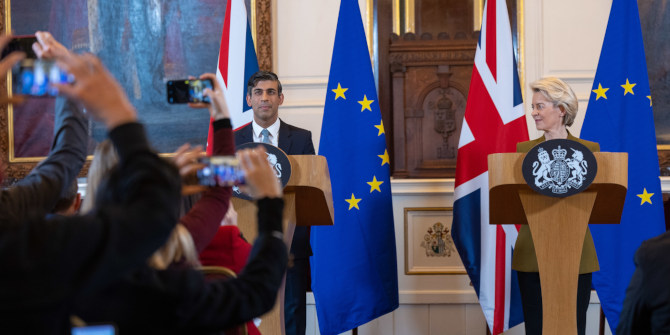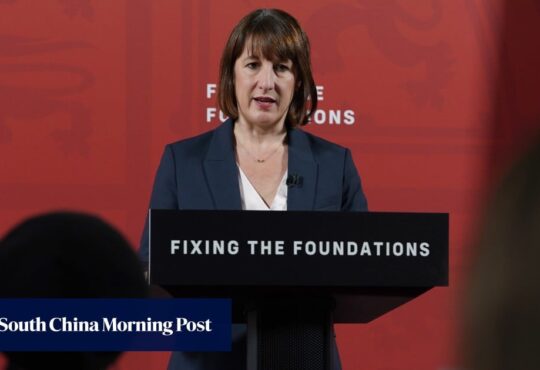
It is now six years and eleven months since the Brexit referendum. Of the 52% who voted to leave, it is clear that some wanted to get out of the EU at any cost, but a much larger number were convinced that departure could and would come at little or no cost. After 83 months, it’s time to take stock.
It’s now three years and six months since a government was elected with the cardinal commitment to “get Brexit done” and three years since the Trade and Cooperation Agreement (TCA) to achieve that came into effect. Since then, arrangements to complete controls on imports into the UK from the EU have (thankfully) been unilaterally postponed four times by the government because of complexities and a lack of capacity. So they haven’t “got Brexit done”.
But, meanwhile, Brexit will not be “done” for some years yet. Under the TCA and Withdrawal Agreement, between now and 2027 there will be expiries and deadlines, innovations, increases and decreases in areas including financial services, the regulation of electric vehicle components, personal data, chemicals, fisheries and energy co-operation. And, in 2025, the TCA can be reviewed.
After 42 months, it’s time to take stock. In doing that, I apologise in advance for using several figures. Some will be familiar, some you might have intelligently assumed. The scale of others will surprise you. Together, these details – which are far from exhaustive – record some of “the real bills for the bungled Tory Brexit”.
I use those words very deliberately. First, because the “real bills” are huge and rising – and they are political as well as economic, cultural as well as commercial. Second, because identifying them is not “remoaning or “bregretting” by an EU pensioner, it is public interest information from a British grandfather. Third, because it puts the blame for the costs, losses, disadvantages and disruption where it belongs – on the governments of the last 81 months, not on the voters…
A bungled Brexit
The vote to Leave was the rough justice of plebiscitary democracy. Since that vote, the dimension and depth of the woeful effects of Brexit – of breaking away from our largest and nearest friction-free market and source of supply, absconding from political influence, abandoning regional and social support – have been disabling. And they all stem from one source: they are the result of the inveterate bungling of governments.
The reason for that serial botching under four prime ministers and six chancellors is also clear: it has come from the efforts to appease the most obsessive Europhobes and populist nationalists in the Conservative Party. They have sabotaged, not served the national interest. That’s why we have suffered a “hard” Brexit from the EU rather than one – such as re-joining EFTA – which could have substantially mitigated the economic and political, social and cultural effects of leaving the Union.
And that bungling and botching is now being compounded by devices like the Retained EU Law (Revocation and Reform) Bill, of which a little more later. Meanwhile, the “real bills” include the evaluation of the pound since June 2016 by 18% against the US dollar (the world’s energy currency) and 13% against the euro (the source of 58% of UK fruit and vegetables, 23% of all food imports and 42% of all imports).
Planned, deliberate devaluations can be useful, when necessary, because reduction in the international value of a currency can boost exports and discourage imports. The post-Brexit unplanned devaluations have had none of those positive effects. The Office for Budget Responsibility (OBR) reports that imports from the EU are down by 18% but exports to the EU are down by 9%.
Both figures have been affected by huge new administrative impediments including border controls, customs checks, import duty, and health inspections on plant and animal products made even more problematic by shortages of vets and truck drivers who have gone home to the EU. Meanwhile “Global Britain’s” imports from non-EU countries are up by 10% but exports to those countries are down by 18%.
Manifest decline
Some of the above changes could, of course, be attributed to the disruptions of the Covid-19 pandemic. But that hit the whole world – and yet the UK is the only major economy which has failed to recover trade and economic growth since that global paralysis.
Part of that failure to recover can clearly be related to two other items on the “real Brexit bill”. First, the LSE Centre for Economic Performance calculates that, since Brexit, UK/EU trade relationships are down by 33%, mainly affecting SMEs – the “backbone of the UK economy” – with much of that reduction caused by new administrative burdens and delays. As a result, some traders have given up, some from the UK have set up operations in the EU, taking jobs and enterprise with them.
Second, according to the OBR, since early 2017 foreign direct investment in the UK has fallen from 4% of GDP to 1% as investors who used to use the UK to enter the single market of 500 million people have gone elsewhere. That’s what “global” capitalism means. Strangely, Brexiters seem not to understand that elementary reality.
That loss of trade and inward investment also helps to explain why the OBR has had to forecast a reduction in potential growth by 4% and in productivity by a similar proportion, all resulting from Brexit. Since every 1% of growth generates about £10 billion of tax revenues, Brexit results in about a £40 billion loss in available funding for the NHS and other vital public services. That’s a huge item on the bill for a Brexit that was promised to gain £350 million a week for the NHS.
And those changes come in the wake of per capita cuts in capital spending of 22% and revenue spending of 10% since 2010. That’s despite some recovery in public spending under “big spender” Boris Johnson – but no increase in funding has been allocated to compensate for 10% inflation which is therefore going to further shave off real terms expenditure on services and investment. None of this litany of loss is what Jeremy Hunt has repeatedly called “a declinist narrative”. It is the plain truth of manifest decline. And it’s the plain factual truth antidote to the gaseous boosterism that is now the stock-in-trade of the government.
Obviously, inflation – post-Covid, and pumped up by energy costs in the wake of Putin’s criminal war on Ukraine – has infected every economy. But the UK has the added burden of Brexit – and that certainly inhibits the ability of the UK to achieve inflation rates that are lower than comparable countries. Like other analysts, the Peterson Institute for International Economics says “Brexit is the primary driver of the inflation differential” and the co-director of the Sussex University Centre for Inclusive Trade Policy says Brexit is “the most plausible reason why Britain is doing comparably worse than comparable countries”.
All of that analysis comes before a further push to inflation likely to come at the end of the year. If the much-delayed introduction of sanitary and physosanitary checks on UK imports of foodstuffs from the EU does take place in December, the new non-tariff obligations will discourage producers, especially smaller producers, from exporting. That will bring shortages or extra costs and fuel further inflation. In short, while Brexit is obviously not the single cause of the cost-of-living crisis, it has made – and will make – the price and supply problems more difficult to absorb and solve.
Myths and falsehoods
In addition, parts of the UK which benefitted from the EU’s Regional and Social Funds have sustained heavy financial and enabling losses. Wales, for instance, (which has great importance to me) was to have received £1.4 billion provided for in the 2020-25 EU Budget. The latest “round” of allocation from the UK’s “Shared Prosperity Fund” brings the total post-Brexit Development funding for Wales up to £840 million – £560 million less than the allocated EU funding, with a further loss of £243 million because of the post-Brexit reduction in farm funding.
When the then prime minister told us a year ago that “free from prescriptive EU rules we can unite and level-up the country in a way which suits our own needs” the glibness was astounding. But the narrative had worked for him before so he could be expected to repeat it.
Repeated analysis has shown that when people voted for Brexit, they were, in large part, alienated by deteriorated, sometimes derelict, economic and social conditions and years of bewildering and demoralising changes. They had been subjected to decades of untruths, half-truths and myths about “Europe” as the source of many woes. They were assaulted by the lie that everything would be better managed, more prosperous and secure when we were “free” of the bureaucracy and bullying of the EU “centralising superstate”. The great majority who voted Leave weren’t stupid or racist, they were resentful and hopeful.
The falsehoods that they accepted were forceful and potent. You will remember some of the most telling: that Brexit might cause some disruption but no economic disadvantage. Yet the UK is poorer than it would have been in measurable terms of growth, investment, productivity, opportunity, public services and personal well-being.
That Brexit would radically reduce immigration and that a ban on EU immigration would generate jobs and improve wages. But inward migration has risen substantially – and yet we now have serious sectoral labour shortages.
That the border with the EU in Ireland would bring no problems. Yet while, after much groping, the UK and EU seem to have achieved a resolution, there has been no devolved government in Northern Ireland for over a year. The DUP appears not to be impressed by being in what Rishi Sunak called “the most exciting economic zone in the world” because it can be in the single markets of both the UK and the EU. The rest of us wearily reflect that the whole of the UK had that advantage before Brexit.
That Brexit, we were falsely told, would facilitate a bonanza US trade deal. But there is no such deal and the stasis over Northern Ireland impedes any prospect of one. Finally, perhaps the most potent lie was that Brexit would mean £350 million a week extra for the NHS. But lower growth means lower revenues available for spending. Any surge in health funding since 2020 has come from the Covid-19 emergency, not from any figmentary EU “savings”. Meanwhile, the post-Brexit loss of qualified health and social care staff has added pressures to those services, and we still have 2.5 beds per thousand people in the UK compared with a European average of 5.9 beds per thousand people.
Taking back control
The promises of an “oven ready” exit, of “holding all the cards”, of “striking the easiest deals in history” were rolled out like bars of fudge in a sweet factory. And the greatest, most magnetic undertaking was that the UK would “take back control”. We would regain and reassert our “sovereignty”.
Sovereignty is a fine word invoking feelings of independence, self-determination and self-reliance. But for countries, especially democracies, stand-alone sovereignty hasn’t been a reality for a very long time. In the world now, and for many decades past, the reality has not been splendid sovereignty in its pomp and circumstance – it’s been inter-dependence: alliance, co-operation, accord, mutuality.
For a medium-sized trading country in northern Europe, the best means of enjoying the power and influence to advance and protect national interests – to exercise meaningful sovereignty – is to mutually share agreed parts of it with other democracies in a community of jointly determined laws.
Withdrawal from that doesn’t bring autonomy, it brings insecurity. It brings dependency on the convenience of others and on the ebb and flow of economic and political preference. What Mark Carney called “the kindness of strangers” – or, indeed, their lack of trust and generosity.
Brexit, we were told, would bring back control of “money, borders and laws”, yet the currency has been substantially devalued and the ruinous global recoil from 49 days of Trussonomics showed that finance cannot be “controlled” like a monetary house-pet. The migration figures, the small boat tragedies (stemming directly from Brexit withdrawal from the Dublin Returns Convention) and the administrative shambles in the Home Office show that the borders are not managed, let alone “controlled”.
The “control of our laws” has been secured – at least by the government. By parliament and the people, not so much. The prime instance of that is the Retained EU Law (Revocation and Reform Bill) which is trundling through the House of Lords. That bill awards complete powers to ministers, not to parliament, to decide the expiry of about 3,800 laws accumulated into UK Statute in our 47-year membership of the European Community and Union.
The laws to be eradicated have a vast scope from consumer rights and transport safety to employment rights, environmental protection, health and safety rules, data protection, animal welfare, conservation areas, estate agent regulation and a myriad of other day-to-day areas of activity, exchange and concern. The “sunset date” for the termination of these laws by ministerial decision is 31 December this year.
Little or no time has been given for consultation with stakeholders; there is no mechanism for replacement of lost laws; no-one knows whether the civil service has the physical capacity to manage the changes; devolved national and local governments have received little attention in decision making; and there is – so far – no review mechanism.
Obviously, if they are used, the ministerial powers in this bill will inflict shambolic legal, political, economic and commercial uncertainty and insecurity on our country as thousands of pieces of law drop off the statute book. But if the powers are not exercised because of impending chaos everyone has the right to ask: “what was the point of that?” and “how could EU law have been so onerous when we are keeping it?”
This bill was contrived by the banal Brexiters Boris Johnson and Rees-Mogg. It has been continued by Sunak for one reason: it is red meat reassurance of “total” Brexit to the Brexobsessives in his party. No petition or demonstration demands it. No industry, investor, council or corporate interest has asked for it. Indeed, the CBI, Institute of Directors and TUC got together last November to urge that the deadline is scrapped.
So far, there has been no positive response. The poisonous internal politics of the Conservative Party are again determining the condition of our democracy, the substance of our rights and protections, and the fate of our country. Faced with that, we could, of course, echo Boris Johnson and simply say “them’s the breaks”, stick any Retained EU Law Act on the lengthening “real bill for a bungled Brexit” and exercise the great British talent for endurance.
“Keep calm and carry on” is, after all, a fine, mature instinct of resilience in wartime, or pandemic, or any national or personal emergency. But when the strains and failures are the result of economic stagnation, underperformance, diminished investment, trade, opportunities and rights brought by Brexit, “keeping calm and carrying on” is not doggedness or determination or fortitude. It is deference. It is servitude. It is obedience to a decision taken on the basis of cumulative disinformation and implemented through deliberate dishonesty and the shredding of “parliamentary sovereignty”. We can’t just submit to that.
The case for a new relationship with the EU
Instead, we have to sustain the rational case for being an economic, political, social, scientific and cultural part of a Europe of the future. Much has changed here and on our continent even in the years since June 2016. Those changes will continue and the challenges and opportunities will shift too.
Recognising that, we have to insist that a new relationship with the EU is forged through achievable agreements on security, veterinary arrangements, science, energy, Northern Ireland, mobility visas for business and school pupils, professional qualifications, biometric passport checks and much else.
Separately, they are steps. Together they are strides towards the security, prosperity, creativity, amity and liberty of being part of a continent of fellow-Europeans. They all emphasise practicality. They all provide mutual advantage. They all offer assurance, dependability. They all foster trust in place of the wariness, suspicion and distrust that now marks relations between the EU and the UK.
My abiding hope is that such a course will be followed by a new government because it will not be pursued with effective vigour by the current paralysed administration. By the time that advance can start, we will have endured over eight lean years of Brexit and it is implausible to believe that efforts to establish a productive new relationship with the EU can inaugurate years of plenty. It would, however, be a good start on the route back to normality and – in the longer term – back to the utility, security, and opportunity of union.




